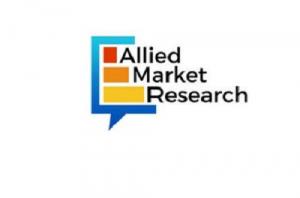Hydrogen Fuel Cell Vehicle Market to Grow at 43.2% CAGR, Reaching $46.4Bn by 2033
Hydrogen fuel cell vehicles enable fast refueling and zero emissions, driving sustainable transport and helping decarbonize the automotive sector.
WILMINGTON, DE, UNITED STATES, August 12, 2025 /EINPresswire.com/ -- According to a new report published by Allied Market Research, titled, “Hydrogen Fuel Cell Vehicle Market by Technology (Proton Exchange Membrane Fuel Cell, Phosphoric Acid Fuel Cell), by Vehicle Type (Passenger Vehicle, Commercial Vehicle), by Range (0-250 Miles, 251-500 Miles, Above 500 Miles): Global Opportunity Analysis and Industry Forecast, 2023 - 2033” The hydrogen fuel cell vehicle market size was valued at $1.3 billion in 2023, and is estimated to reach $46.4 billion by 2033, growing at a CAGR of 43.2% from 2024 to 2033.The hydrogen fuel cell vehicle (FCV) market is emerging as a promising segment within the automotive industry, driven by the growing demand for clean and sustainable transportation solutions. Hydrogen fuel cells generate electricity by combining hydrogen with oxygen, emitting only water vapor as a byproduct, making FCVs an eco-friendly alternative to conventional internal combustion engine vehicles. Increasing government support, advancements in hydrogen refueling infrastructure, and rising environmental awareness are fueling the adoption of hydrogen fuel cell vehicles globally.
Download PDF Brochure: https://www.alliedmarketresearch.com/request-sample/A04207
𝗠𝗮𝗿𝗸𝗲𝘁 𝗗𝘆𝗻𝗮𝗺𝗶𝗰𝘀
1. Growth Drivers:
The hydrogen FCV market is propelled by stringent emission regulations worldwide and rising consumer demand for zero-emission vehicles. Governments in regions like Europe, North America, and Asia-Pacific are investing heavily in hydrogen infrastructure and providing subsidies to encourage fuel cell vehicle adoption. This supports automakers in launching new hydrogen-powered models.
2. Technological Advancements:
Innovations in fuel cell technology, such as improved power density, durability, and reduced costs, are making FCVs more competitive against battery electric vehicles (BEVs). Advances in hydrogen storage and fuel cell stack efficiency also contribute to better vehicle performance and longer driving ranges.
3. Infrastructure Challenges:
Despite progress, limited hydrogen refueling stations and high infrastructure development costs pose major challenges to widespread FCV adoption. The absence of a comprehensive refueling network restricts consumer confidence and limits market penetration, particularly outside major urban hubs.
4. Competitive Pressure:
The rise of electric vehicles and the decline in battery costs present significant competition to hydrogen FCVs. Consumers and manufacturers weigh the benefits of fast refueling and longer range of FCVs against the expanding BEV ecosystem, influencing market dynamics.
5. Opportunities in Commercial and Heavy-Duty Vehicles:
Hydrogen fuel cells are gaining traction in commercial transport sectors such as buses, trucks, and trains where long driving ranges and quick refueling are critical. These applications offer substantial growth opportunities due to lower emissions and high efficiency compared to diesel engines.
Snag Discount: https://www.alliedmarketresearch.com/checkout-final/A04207
𝗦𝗲𝗴𝗺𝗲𝗻𝘁 𝗢𝘃𝗲𝗿𝘃𝗶𝗲𝘄
The hydrogen fuel cell vehicle market analysis is segmented into technology, vehicle type, range, and region. On the basis of technology, the market is segregated into proton exchange membrane fuel cell, and phosphoric acid fuel cell. Based on vehicle type, the market is segmented into passenger vehicle and commercial vehicle. On the basis of range, the market is fragmented into 0-250 miles, 251-500 miles, above 500 miles. Region- wise, the market is analyzed across North America, Europe, Asia-Pacific, Latin America, and Middle East and Africa.
𝗥𝗲𝗴𝗶𝗼𝗻𝗮𝗹 𝗔𝗻𝗮𝗹𝘆𝘀𝗶𝘀
Asia-Pacific dominates the hydrogen fuel cell vehicle market, led by countries such as Japan, South Korea, and China, which have invested heavily in hydrogen infrastructure and fuel cell research. Government incentives and partnerships between automakers and energy companies in this region continue to boost FCV adoption. The region also benefits from strong industrial bases and increasing urbanization.
Europe and North America are key markets driven by environmental policies and growing commitments to reduce carbon emissions. Countries like Germany and the United States have launched initiatives to expand hydrogen refueling networks and promote fuel cell vehicle production. However, infrastructure limitations still challenge widespread adoption in these regions.
For Purchase Inquiry: https://www.alliedmarketresearch.com/purchase-enquiry/A04207
𝗖𝗼𝗺𝗽𝗲𝘁𝗶𝘁𝗶𝘃𝗲 𝗔𝗻𝗮𝗹𝘆𝘀𝗶𝘀
The market is highly competitive, with several key players dominating the industry. Prominent manufacturers focus on innovation, product differentiation, and strategic partnerships to maintain their market positions. Market leaders include companies such as Hyundai Motor Group, AB Volvo, Mercedes-Benz Group AG (former Daimler AG), AUDI AG, Honda Motor Co., Ltd., General Motors, BMW Group, MAN SE, TOYOTA MOTOR CORPORATION, and Stellantis.
New entrants and startups focused on fuel cell technology and hydrogen production are also entering the market, aiming to innovate and disrupt traditional automotive models. Strategic partnerships, joint ventures, and government-backed pilot projects are common strategies to accelerate technology adoption and infrastructure development.
𝗞𝗲𝘆 𝗳𝗶𝗻𝗱𝗶𝗻𝗴𝘀 𝗼𝗳 𝘁𝗵𝗲 𝘀𝘁𝘂𝗱𝘆
• Increasing environmental regulations and government incentives are accelerating hydrogen FCV adoption.
• Asia-Pacific holds the largest market share due to extensive infrastructure investments.
• Infrastructure development remains a significant challenge limiting mass adoption.
• Technological advancements are reducing fuel cell costs and improving vehicle efficiency.
• Commercial and heavy-duty vehicle segments offer high growth potential beyond passenger cars.
Trending Report in Automotive and Transportation Industry:
Hydrogen Fuel Cell Truck Market
https://www.alliedmarketresearch.com/hydrogen-fuel-cell-truck-market-A74607
Hydrogen Fuel Cell Train Market
https://www.alliedmarketresearch.com/hydrogen-fuel-cell-train-market-A07806
Automotive Natural Gas Vehicle Market
https://www.alliedmarketresearch.com/automotive-natural-gas-vehicle-market-A09132
Automotive Fuel Cell Market
https://www.alliedmarketresearch.com/automotive-fuel-cell-market-A08903
Fuel Cell Bikes Market
https://www.alliedmarketresearch.com/fuel-cell-bikes-market-A10059
David Correa
Allied Market Research
+15038946022 ext.
email us here
Visit us on social media:
LinkedIn
Facebook
YouTube
X
Legal Disclaimer:
EIN Presswire provides this news content "as is" without warranty of any kind. We do not accept any responsibility or liability for the accuracy, content, images, videos, licenses, completeness, legality, or reliability of the information contained in this article. If you have any complaints or copyright issues related to this article, kindly contact the author above.

